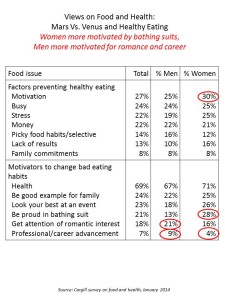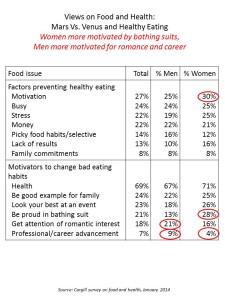Americans have been eating more healthfully in the past couple of years, according to the USDA which examined eating patterns among working-age adults in the U.S. between 2005 and 2010.
And most people do believe they are indeed healthy eaters: three-quarters of people in the U.S. say they eat healthfully. On the other hand, it’s difficult to do that consistently. Why? Lack of motivation (37%), busy schedules (33%), lots of stress (30%), and money (29%).
Underneath these numbers are differences between women and men. When it comes to food and healthy eating, it seems men are from Mars and women, Venus, based on the Truvia® Food Habits Survey from Cargill, the global food manufacturer.
For example, when asked what type of foods they would sacrifice, one-half of women in the U.S. would refuse to give up sweets under any circumstances. One-half of men would refuse to give up a steak, a burger or bacon (categorized as savory foods in the Truvia poll).
To be rich, 43% of men would sacrifice their favorite food. However, one-third of women would give up their favorite food to be rich or to be skinny. (Who was it who said you could never be too rich or too thin? Skip to the end of the Hot Points below to find out).
This survey is part of a healthy eating campaign that Truvia launched at the beginning of 2014, including the Stay TRU to You Facebook page to help healthy eaters stick to their commitments to eating right.
Toluna PLC fielded the study on behalf of the Truvia brand, surveying adults 18 and over in the U.S. (1,051), the U.K. (1,066), and France (N=1,061) in September 2013. The discussion here focuses only on the U.S. data.
The global comparisons are intriguing: the French tend to be healthier eaters, with 30% of them seeing themselves as such versus 21% of U.S. and British consumers. But 45% of French people won’t ever part with their favorite foods, compared with 28% of Americans and 33% of Britons. And only 9% of French eaters snack throughout the day, whereas 19% of Americans do.
Truvia is a sugar-substitute that is made from the stevia leaf.
Health Populi’s Hot Points: It’s also important to note that we humans are trainable. As the USDA discovered in their study, Americans have actually improved our nutritional habits in the past several years, and not only due to economic factors (although these do play an ongoing role in shaping our personal health ecosystems).
To help us in continuing to build healthy eating habits and knowledge, the FDA is in the process of updating the nutrition label. It’s about time and a welcome development. We’ve learned so much about the role of protein in our diets, white carbohydrates, sugars, and fats – good and bad ones.
As Audrey Hepburn noted in the Truvia ad shown, a little bit of indulgence can do a lot for us…one choice and one day at a time. It’s finding balance in eating well and smart, that’s tricky for every one of us, and we’re on the road to getting better at this with helpful tools like that evolving nutrition label, mobile health apps like Fooducate and My Fitness Pal, and self-tracking devices. These, coupled with incentives that our health plans or employers may provide in wellness programs, can provide helpful nudges along our individual journeys.
Answer to “too rich or too thin” question: No, not the wondrous Audrey Hepburn. It was Wallis Simpson, the American woman for whom King Edward gave up the British throne, who was quoted as saying “You cannot be too rich or too thin.”







 Interviewed live on BNN Bloomberg (Canada) on the market for GLP-1 drugs for weight loss and their impact on both the health care system and consumer goods and services -- notably, food, nutrition, retail health, gyms, and other sectors.
Interviewed live on BNN Bloomberg (Canada) on the market for GLP-1 drugs for weight loss and their impact on both the health care system and consumer goods and services -- notably, food, nutrition, retail health, gyms, and other sectors. Thank you, Feedspot, for
Thank you, Feedspot, for  As you may know, I have been splitting work- and living-time between the U.S. and the E.U., most recently living in and working from Brussels. In the month of September 2024, I'll be splitting time between London and other parts of the U.K., and Italy where I'll be working with clients on consumer health, self-care and home care focused on food-as-medicine, digital health, business and scenario planning for the future...
As you may know, I have been splitting work- and living-time between the U.S. and the E.U., most recently living in and working from Brussels. In the month of September 2024, I'll be splitting time between London and other parts of the U.K., and Italy where I'll be working with clients on consumer health, self-care and home care focused on food-as-medicine, digital health, business and scenario planning for the future...